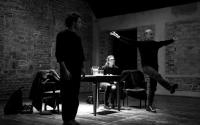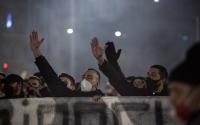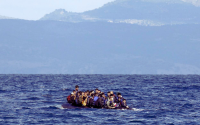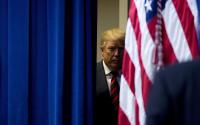1 February 2008Kim Sengupta, Jerome Starkey
Afghanistan's President, Hamid Karzai, has been inundated with appeals to save the life of Sayed Pervez Kambaksh, the student journalist sentenced to death after being accused of downloading an internet report on women's rights.
While international protests mounted over the affair, with the British Government saying it had already raised its concerns, hundreds of people marched through the capital, Kabul, demanding Mr Kambaksh's release.
A petition launched yesterday by The Independent to secure justice for Mr Kambaksh had attracted more than 13,500 signatories by last night, and a number of support groups have been set up on the social networking site Facebook with more than 400 joining one group alone.
Mr Kambaksh, 23, was arrested, tried and convicted by a religious court, in what his friends and family say was a secret session without being allowed legal representation.
The United Nations, human rights groups, journalists' organisations and diplomats urged Mr Karzai's government to quash the death sentence and release him.
Instead, on Wednesday, the Afghan senate passed a motion confirming the death sentence. The MP who proposed the ruling condemning Mr Kambaksh was Sibghatullah Mojadedi, a key ally of Mr Karzai.
In London David Miliband, the Foreign Secretary, told The Independent that Britain had raised Mr Kambaksh's case as a member of the European Union and with the United Nations, as well as strongly supporting a call by the UN special representative to Afghanistan for a review of the verdict.
He said: "We are opposed to the death penalty in all cases and believe that freedom of expression is one of the cornerstones of a democratic society." The British Government is funding training for journalists in the country as part of an effort to create a civic society.
Nick Clegg, the leader of the Liberal Democrats, said: "It is clear that this case has nothing to do with blasphemy and everything to do with prejudice. Afghanistan is sliding back towards the bad old days where women were subjugated and journalists persecuted. We have invested far too much in Afghanistan to allow freedom and democracy to falter. If this sentence is carried through, it will raise major questions about the country's future."
William Hague, the shadow Foreign Secretary, said: "We call upon President Karzai and his government to urgently reconsider the decision to sentence Pervez Kambaksh to death. Mr Kambaksh was tried without being allowed any legal representation. Moving towards the rule of law is a vital part of peace-building in Afghanistan. The people of Afghanistan cannot feel secure unless protected by a body of law and a functioning judicial system."
The former foreign office minister Denis MacShane, who has raised the matter of Mr Kambaksh's "persecution" with the Foreign Office, said: "The challenge to freedom of expression from fundamentalist Islam is now a major world problem. The maximum pressure must be put on President Karzai, ministers and MPs in Afghanistan stressing that if they want to be partners in democracy then this young man must be set free."
The Liberal Democrat MP Alistair Carmichael, chairman of the all-party group for the abolition of the death penalty, has put down an early day motion urging the British Government to intercede to save Mr Kambaksh's life. In a Commons plea to Harriet Harman, the Leader of the House, he said: "I draw the Leader of the House's attention particularly to the front page of The Independent which highlights the case of Sayed Pervez Kambaksh... Surely, given our current involvement in that country... we will not just sit back and allow this monstrous act to take place without doing anything about it?"
Ms Harman replied: "The Government are determined to stand up for human rights, including freedom of speech, in all countries, and are of course concerned about the matter."
Among the representations received by Mr Karzai was one from the International Federation of Journalists, based in Brussels, which stated: "Upholding freedom of expression is essential for your country's democratic progress. This death sentence indicates a disregard by your government for its own constitution."
The Committee to Protect Journalists, based in New York, pointed out that the trial was held in secret and expressed concern that any appeal process would be biased. The organisation said in its letter: "He should be allowed to resume his studies without delay or punishment."
The row over Mr Kambaksh's death sentence came during another day of violence in Afghanistan.
Abu Laith al-Libi, reputed to be the senior al-Qa'ida commander in the country, was said to have been killed. US and British officials said they were receiving "normally reliable reports" that al-Libi was killed during a rocket attack in northern Waziristan on the Afghan-Pakistan border earlier in the week. A website used by Islamist groups, ekhlaas.org, said last night evening that al-Libi had "fallen a martyr".
Earlier yesterday, the deputy governor of Helmand province, Haji Pir Mohammed, was killed in a suicide bomb attack on a mosque. This followed a blast in Kabul's Taimani district in which a dozen people were said to be injured.
Mr Pir Mohammed was regarded as an ally of the British at a time when UK policy in the country is coming under strong criticism from President Karzai and senior Afghan officials.
Mr Miliband said the death was "a horrific reminder of the difficulties we face in Afghanistan". He added: "The sheer scale of the task is enormous and we will only succeed if we have better co-ordination between the international community and the Afghan government."
How you can save Pervez
The Independent campaign to save Sayed Pervez Kambaksh has already attracted 13,500 signatures. But the more pressure that can be brought to bear on President Karzai, the more likely it is that his sentence will be revoked. So add your voice to the campaign by urging the Foreign Office to put all possible pressure on the Afghan government to spare his life. Sign our e-petition at www.independent.co.uk/petition






